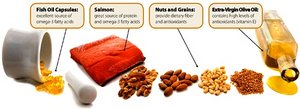The number of nutrients involved in joint function (at least the ones we know about) is surprising. It is essentially the same as for all connective tissue, like bone. There are 30-plus known factors involved in building and maintaining bones. For example:
- Manganese is a trace mineral; it is essential for the proper function and maintenance of bone, cartilage and connective tissues.
- Calcium is also an essential nutrient. It is the most important element required for the body to maintain strong bones and teeth.
- Vitamin E is a powerful antioxidant that increases joint mobility and protects the joints from damage by free radicals. One of the richest sources of the complete vitamin E complex is found in wheat germ oil.
- Co-enzyme Q10 increases tissue oxygenation to aid in repair of connective tissues. This important nutrient can be found naturally in bovine (cow) heart tissues.
The combination of these ingredients and others from whole-food sources contributes to the overall functioning and well-being of the skeletal system through a number of physiological processes. I recommend a complex formula that provides food-based nutrients to support ligament and tendon activity. It is derived from what you ought to be eating, but probably aren't.
For your muscles - and for every cell in your body - the source of energy that keeps everything going is called ATP (adenosine triphosphate). ATP is the biochemical way to store and use energy and efficiently dispose of waste products. A major player in this activity is the B family of vitamins. Talk with your health care professional about taking a whole-food vitamin B supplement that naturally contains small amounts (just like food) of all of the factors our bodies need, not just the very few of which we have knowledge.
 Cardiovascular health is of great concern to many people, especially to us baby boomers. It is a major killer of our time and one of the reasons people decide to take up physical activity. There are several nutrients known to assist the heart when under stress. Co-enzyme Q10 is one example. People take hundreds of milligrams of this daily, yet never stop to consider that no human ever had such a thing available, and that human consumption has always been in micrograms, not milligrams. The best source of co-enzyme Q10, as mentioned, is bovine heart tissue. Another important nutrient for the heart is choline. Choline helps maintain healthy homocysteine levels. Healthy homocysteine levels have been correlated with maintaining healthy blood vessel diameter. The B vitamins also help maintain a healthy and strong heart. For example, vitamin B6 may help maintain healthy blood pressure and circulation. I recommend a whole-food supplement containing a variety of the foods that provide these and other important nutrients to support the heart.
Cardiovascular health is of great concern to many people, especially to us baby boomers. It is a major killer of our time and one of the reasons people decide to take up physical activity. There are several nutrients known to assist the heart when under stress. Co-enzyme Q10 is one example. People take hundreds of milligrams of this daily, yet never stop to consider that no human ever had such a thing available, and that human consumption has always been in micrograms, not milligrams. The best source of co-enzyme Q10, as mentioned, is bovine heart tissue. Another important nutrient for the heart is choline. Choline helps maintain healthy homocysteine levels. Healthy homocysteine levels have been correlated with maintaining healthy blood vessel diameter. The B vitamins also help maintain a healthy and strong heart. For example, vitamin B6 may help maintain healthy blood pressure and circulation. I recommend a whole-food supplement containing a variety of the foods that provide these and other important nutrients to support the heart.

